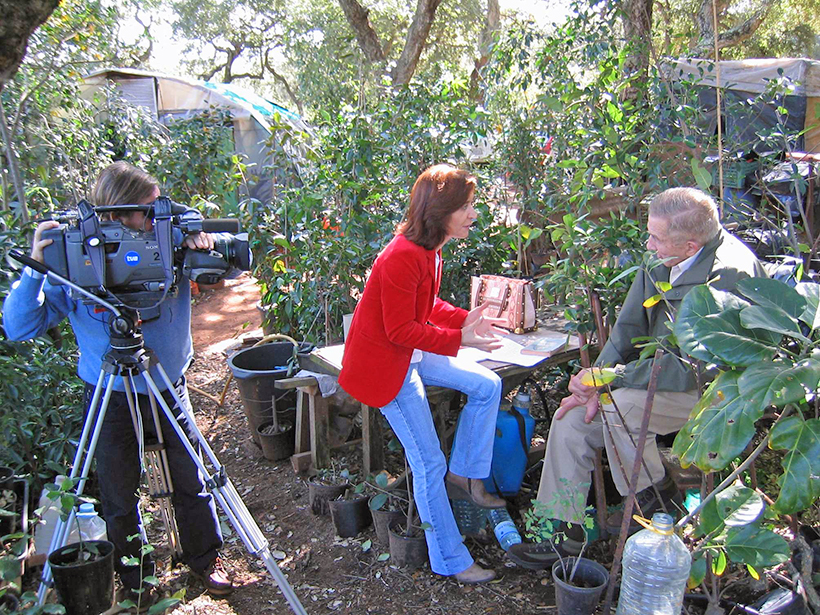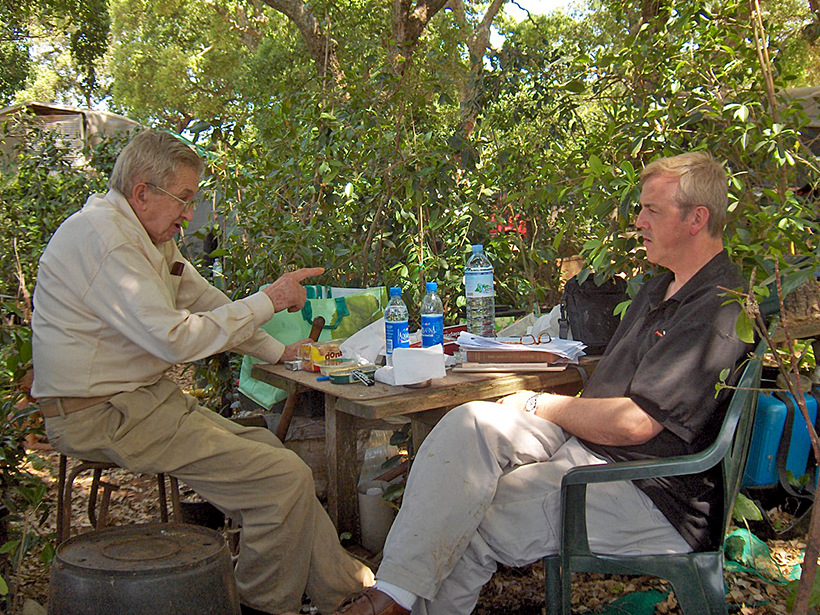“The only way to save this world and achieve a peaceful world is to teach love for creation, nature and animals. If you want to help and promote this idea, maybe we can still save this planet”. Claes Linden
Time passes quickly. The memories, the experiences, the joys and sorrows, form grooves in your life that leave their mark. Some are petrified and can be forgotten or at least removed from memory, but others mark your path and, like a beacon in the sunset, light up our steps and our memories.
That is why I have never stopped thinking about Claes Linden, a wise man of the past, a practical scientist with a sensational curriculum and an outstanding intelligence, who tried to fight for and defend his ideals. He created a Foundation in Spain to save the rainforests. His experience was unique and his love for the great apes made him buy four chimpanzees in Africa where they were going to be sacrificed, saving them from certain death, and he took them to a small town in Cádiz, where, far from houses and civilisation, he set up his dream and his hope of saving the world.
This is the very short story of the last wise man of the 21st century, of the last man of science who sought hard to be understood and did not mind living in the dark, without water, without electricity, in a greenhouse hut where no one could enter because it was his world and his life, where he kept his memories, his books, his inventions, his documents. He gave a lot for humanity and it repaid him by ignoring him and plunging him into destitution, like the great men of history who have been forgotten despite having given his life and his knowledge for the benefit of future generations.
He invested in his passion, but was betrayed many times to the point of not trusting anyone, no matter how well-intentioned. Life hit him hard. He was abandoned by his family for unknown reasons. Perhaps his sour character, which he showed on many occasions and which was his only defence against the doors that were constantly closing in on him, was an impediment that forged his nature in front of others, forming a protective shield that made him take precautions before others, before the dark world that stalked him.
Nobody knew him until I came into contact with him and I wanted him to be known and his ideas, which he defended so strongly, to appear in the media during his lifetime. I succeeded and for a long time he saw in me a lifeline, a floater to hold on to and use if necessary to show the world that he was right, that climate change was a direct consequence of the destruction of the rainforests.
Surely Linden could be removed them from a Jules Verne book. But we had him in the flesh, living in abject poverty, spending what little pension money he received (400 euros) on feeding his dogs who were his only family, on the letters he sent, on the fuel for an old car that was his motor and his means of getting around town.
He began to be called upon to give lectures and he would flirtatiously put on his only jacket in the hope that his words would be heard and to shout to the world that we were hopelessly approaching a catastrophe with irreparable consequences for the planet. He didn’t care that he was hungry, thirsty, cold, or that the night came and he could only light himself with a torch, the only important thing for him was that he was listened to and that the rainforests had to be protected immediately.
When he had the chimpanzees in his tropical nursery, they escaped several times and one of them tore off his finger. He said they had been poisoned and were therefore out of their minds. The chimpanzees were bitterly taken away from him, because despite the attack, he loved them as his children. Perhaps from that moment on the bitterness in his heart intensified and he blamed everything that happened to him on third parties who did not want him to be in his nursery. On many occasions it was true, on other occasions paranoia ravaged his mind and he thought the world was against him. Maybe it was. Not those of us who were close to him, but the system, society as a whole that did not understand how a wise man had come to the point of being so poor.
How many men and women in the history of mankind have been and are forgotten despite all they did for the common benefit of the planet. Linden was the last of his extirpation. In his last years at least, his life was public and those of us who wanted to help him were there with our unconditional support to improve his situation. His world and his life was in his nursery which he did not want to leave for a long time for fear that when he returned everything would have been taken away from him.

Interview with Dr. Linden. Photo: Pedro Pozas Terrados
In spite of all this, he was a man of integrity, with a sense of justice and who did not mind wasting time and the little money he had as long as his voice was heard. I did everything I could to make this happen, I took him to the television stations, to the media, I appointed him scientific advisor to the Great Ape Project and I looked for three places for him so that he could leave the small brass nursery he had at home, so that he could live in a proper house, with light, heating, water… but his stubbornness and mistrust was always present, his mistrust made him lose many friends, it dented his way of being and was precisely the main cause of his loneliness. But he always had my friendship, either to scold me or to congratulate me.
He used to tell me that he was a one-man army. But the truth is that he did not let anyone join that army. The few documents I have about him are enough to judge his life. I have his e-mails and messages and I hope that all this will help to ensure that Liden is not forgotten, that he is recognised for the effort he made for all in exchange for nothing.
Wherever he is, he will surely be watching in grief as climate change continues to increase unchecked and its effects on the planet are already causing thousands of deaths. He warned, but his voice was lost in the wind. This is the story of a sage in oblivion, in destitution. A scientist who lived in solitude, in the struggle to save our planet, in the indifference of a society that turned its back on him, that taught him to be distrustful, to isolate himself in his world of ghosts and realities.
He did nothing more than assure before television cameras or conferences where he was invited, that climate change was fundamentally produced by the destruction of the tropical rainforests that are found on the planetary line of the equator and that when they were destroyed, it affected the planetary winds that were formed on the equator and which spread to both hemispheres (north and south) and that as a domino effect altered the world’s climate. It was not so much CO2 alone, but other greenhouse gases and the destruction of the rainforests.
Dr. Claes T. C. Linden, a forestry engineer from the University of Sweden, PhD in Tropical Agriculture from Cornell University in the USA and former Director General of the Faculty of Agriculture in Zaire, promoter of the integrated agricultural system in Nigeria today called silvoagriculture, working for many years for the FAO (Food and Agriculture Organization of the United Nations) and a lifetime dedicated to science, research and study of the rainforests, nobody heeded his warnings. He was obsessed, and rightly so, that climate change could be avoided if the world’s forests were left intact. On his small plot of land, he had planted numerous tropical plants until his water was cut off.
His workplace, a table under a tree, and his computer, an old-fashioned typewriter. His living room had several wooden boxes to sit on under the dense branches of a beautiful tree. The murmur of birdsong mingled with the rattling of the keys of his typewriter. He sent letters to all the authorities, most of which went unanswered. His house was a small brass greenhouse. He had no light, only the stars and the moon on clear days illuminated his world, which he did not want to leave. He jealously guarded his inventions like a natural insecticide that also helped the plants to grow. He used to charge his mobile phone with an invention of batteries that he connected to the mobile phone to charge it. Getting to know him as I did, was undoubtedly to be transported to a Jules Verne book where a destitute, hungry, wise man, with dogs he adored and fed despite his hardship, fought against climate change. A true scientist, perhaps the last one who really lived for others and to defend biodiversity. He won no prizes. Nobody was interested in him, even though I managed to make his story public and get it into the press, on public television and Canal Sur.
Before any of today’s “scientists” raised their voices about climate change, he had been denouncing what was happening since 1989, without science paying the slightest attention to him.
But in August 2011, his life was snuffed out. He stopped fighting. He left his world tired of oblivion, of hopelessness, of the passivity of governments, of the sadness of not being able to achieve his great goal of saving the rainforests and all their biodiversity. More than a decade now. He rests in the cemetery of Castellar de la Frontera (Cádiz) where his few friends planted a tree in his memory. I could not go to his farewell, but tears flooded my heart as I felt privileged to have known and treated him for more than five years.
Today, a study led by researchers at the University of California, Irvine (USA) has concluded, for the first time, how the protection of tropical forests can generate climate benefits and that their destruction accelerates climate change. The extent to which deforestation in tropical rainforests contributes to the effect on regional and global climate has never been analysed before. It is known that they did not know Linden who, for years and in dozens of conferences, continuously denounced it. This is an example of the contempt that was shown to a great scholar and how science only pays attention to the way it can be of interest to gain personal or group points.
Yes, he was right and nobody paid any attention to him. A sage in oblivion, a scientist of the past who, despite his poverty, stood firm in his studies, in his denunciations, in his reasoning, and that of course deserves to write a book, which I am preparing, a book that collects his call, his unheard and ignored voice, his struggle, his desire to do good for humanity even though it had abandoned it to its fate where he died in the loneliness of his struggle.
“To drive a car, you need a licence and to know the rules of the road. But to lead the world…what does it take? …..NADA…only great verbal ability and being on a party list. Shouldn’t those who are supposed to lead the world, the politicians, be required to know biology and the rules of nature? This is one of the most serious mistakes of democracy and the world”. Claes Linden






